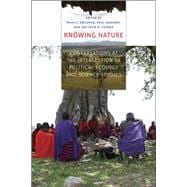
Note: Supplemental materials are not guaranteed with Rental or Used book purchases.
Purchase Benefits
What is included with this book?
| Introduction | p. 1 |
| Production of Environmental Knowledge: Scientists, Complex Natures, and the Question of Agency | |
| Introduction | p. 25 |
| Politicizing Environmental Explanations: What Can Political Ecology Learn from Sociology and Philosophy of Science? | p. 31 |
| Debating the Science of Using Marine Turtles: Boundary Work among Species Experts | p. 47 |
| Technobiological Imaginaries: How Do Systems Biologists Know Nature? | p. 65 |
| Agency, Structuredness, and the Production of Knowledge within Intersecting Processes | p. 81 |
| Fermentation, Rot, and Other Human-Microbial Performances | p. 99 |
| Ferricrete, Forests, and Temporal Scale in the Production of Colonial Science in Africa | p. 113 |
| Application of Environmental Knowledge: The Politics of Constructing Society/Nature | |
| Introduction | p. 129 |
| ôWe Don't Harvest Animals; We Kill Themö: Agricultural Metaphors and the Politics of Wildlife Management in the Yukon | p. 135 |
| Political Violence and Scientific Forestry: Emergencies, Insurgencies, and Counterinsurgencies in Southeast Asia | p. 152 |
| Spatial-Geographic Models of Water Scarcity and Supply in Irrigation Engineering and Management: Bolivia, 1952-2009 | p. 167 |
| The Politics of Connectivity across Human-Occupied Landscapes: Corridors near Nairobi National Park Kenya | p. 186 |
| Circulation of Environmental Knowledge: Networks, Expertise, and Science in Practice | |
| Introduction | p. 203 |
| Rooted Networks, Webs of Relation, and the Power of Situated Science: Bringing the Models Back Down to Earth in Zambrana | p. 209 |
| Circulating Science, Incompletely Regulating Commodities: Governing from a Distance in Transnational Agro-Food Networks | p. 227 |
| Reclaiming the Technological Imagination: Water, Power, and Place in India | p. 244 |
| Circulating Knowledge, Constructing Expertise | p. 263 |
| Experiments as ôPerformancesö: Interpreting Farmers' Soil Fertility Management Practices in Western Kenya | p. 280 |
| Conclusion | p. 297 |
| References | p. 305 |
| List of Contributors | p. 343 |
| Index | p. 345 |
| Table of Contents provided by Ingram. All Rights Reserved. |
The New copy of this book will include any supplemental materials advertised. Please check the title of the book to determine if it should include any access cards, study guides, lab manuals, CDs, etc.
The Used, Rental and eBook copies of this book are not guaranteed to include any supplemental materials. Typically, only the book itself is included. This is true even if the title states it includes any access cards, study guides, lab manuals, CDs, etc.